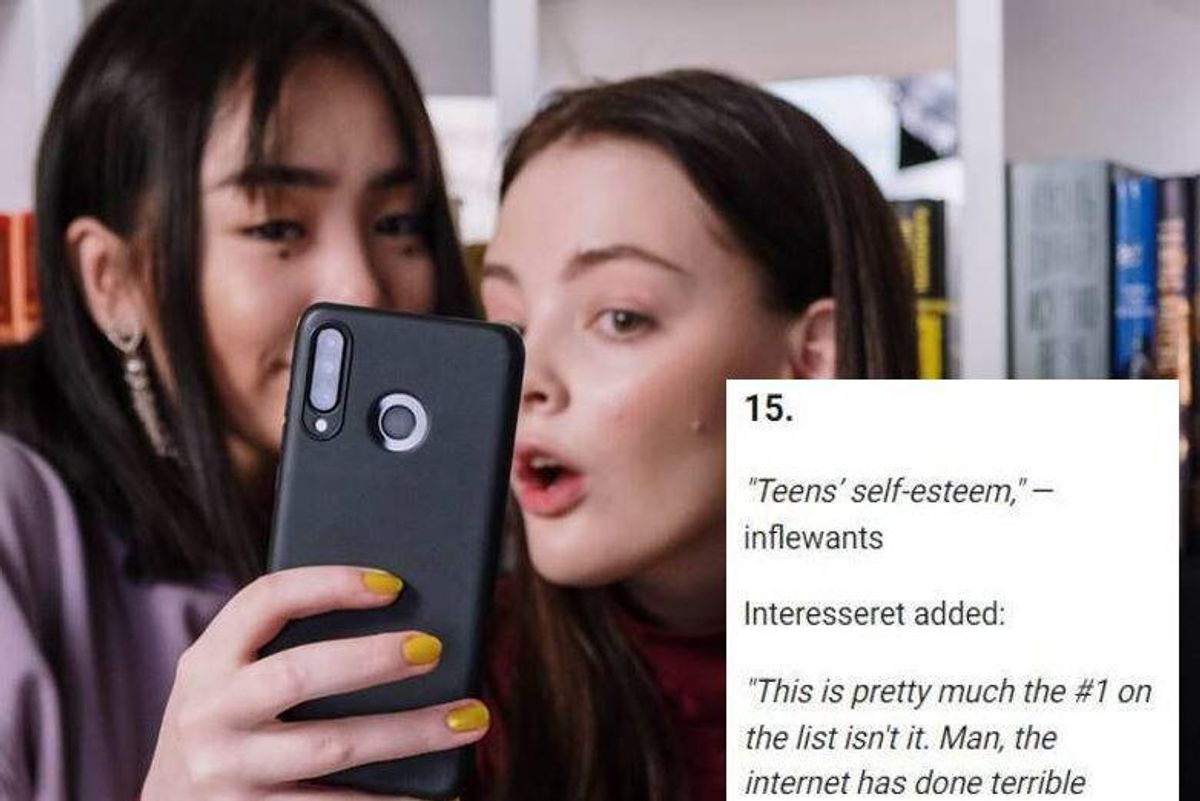People are sharing the things that have been 'killed' by the internet
Here are 19 of the things people miss the most.

Teens taking a selfie.
Whether you think the internet has been a net positive or negative for the world, there’s no debating that it has changed nearly everything. The change has been so rapid and abrupt that humanity hasn’t really come to grips with this new reality. It’s like we’re constantly playing catch-up.
There was the first wave of the internet that completely wiped out physical media such as record stores and magazines. Then there was a revolution with social media that changed the way people interact and gave everyone a voice online.
Some point to Facebook’s addition of the “like” button in 2010 as the moment when social media became an addiction, with people chasing approval and dopamine hits. While others say that the addition of the “share” button the same year completely changed reality because it allowed bad ideas to take wing.
Now, nearly 30 years after the internet became available to the average person, there is a generation growing up that never knew what life was like before the ’net. But for the rest of us, there are still memories of a time when people went to Blockbuster video to get a movie, dialed people on rotary phones and found an intersection on a Thomas Guide map.
I’m not saying those times were better, just different.
A Reddit user by the name of Jenn was feeling nostalgic for the pre-internet days so they asked the online forum, “Video killed the radio star. What did the internet kill?" The question was a reference to The Buggles' 1979 hit “Video Killed the Radio Star,” which was the first video ever played on MTV.
The post quickly went viral with more than 7,000 people chiming in with things that the internet relegated to the dustbin of history.
Here are 19 of the best responses to the question, “What did the internet kill?”
1.
"Newspapers. Magazines." — Cuttlery
2.
"Blockbuster." — sparkchaser
3.
"Encyclopedias." — New_Television_9125
4.
"Not being able to remember that guy from that thing." — Meffrey_Dewlocks
Volcano-ngh added:
"Not having to listen to my mom and my uncle list off names trying to remember the name of some actor in a 100-year-old movie for an hour with no resolution is pretty great."
5.
"Maps. I have never used a tangible map since internet and phones." — TheMaskedAdvice
6.
"Realistic expectations of success." — NelsonsBuddy
Cerker added:
"With your former limited peer group, your were bound to be 'the expert' or 'the best' in at least something. And could provide valuable contributions due to this. Now? You can always compare yourself to the whole world. You always find tens of people so far above your level that you have no realistic means to come even close to it. It was always that way, but they weren't that prominent in your life, always pointing out your mediocrity. I still struggle with it and it used to suck up all my motivation. Now I start to stop caring and just doing what provides my joy."
7.
"The mail order catalogue. This was a huge means of buying goods, especially in rural areas or ordering niche items that normally aren't stocked in stores." — TheSeaMonkey
8.
"Attention span." — LegacyRW
"I’ve actually just started working on this. Limiting my phone time and forcing myself back to reading, puzzles, projects that require concentration etc." — catsinlittlehats
9.
"Broadcast television." — katomka
10.
"My faith in humanity." — cucake_bliss
Uhh_JustADude added:
"Before, you knew most people were kinda stupid. It’s just that back then, they never amounted to much and certainly weren’t as enabled or encouraged. People used to have shame and self-awareness and to publish some bullshit for the whole world to see, one had to get it past editors who actually worked for their jobs and had degrees in journalism, English, and literature."
11.
"Record stores. Not all, but lots. We used to have 10 in my city in the 1990s, now we have 2." — boxoffingernails
12.
"Movie phone.
You haven't lived until you tried to spell the title of a movie on your keypad while declining the suggestions of the robot.
'Did you mean..?'
'_____ is also playing at…'" — brutcookie5
13.
"Mail, not E-mail but good old fashion letter mail. The only kinds of letters i get now are bills and other shit i don't want." — Lekenthereal
14.
"The Internet killed shame. Nothing is shameful anymore, it's all just monetized and fed to people from TikTok and YouTube videos, to 4chan and Reddit subs, to the very incel-laden dark alleys of the web. Nothing killed personal shame like the internet. We get to see the worst of humanity at our fingertips 24/7." — XmerianMonk
15.
"Teens’ self-esteem." — inflewants
Interesseret added:
"This is pretty much the #1 on the list isn't it. Man, the internet has done terrible things to young people's self-image."
16.
"4-1-1." — AllFuzzedOut
Nihlism4U added:
"Omg yes! Also just lots of random phone numbers you could call to get pre-recorded info...time, temperature, there was one I used to call a lot for like...daily science facts or something? Don't remember exactly, but I certainly used the phone as a lifeline to information as a kid in the '80s and early '90s."
17.
"Democracy." — ChopEee
"This is sadly very true. The Internet has allowed the dissemination of fringe ideology to a huge audience. YouTube and Facebook algorithms help push more of that content in front of people. Those who had a predilection to buy into conspiracy theories and other sorts of fringe thinking previously never had easy access to this kind of content. Sure, we would still have Fox News and the like, but that’s pretty mild compared to what’s available online." — Pray44Mojo
18.
"The mall." — dumberthenhelooks
19.
"The experience of actually going out and doing things yourself." — Evening-Ad-9976

